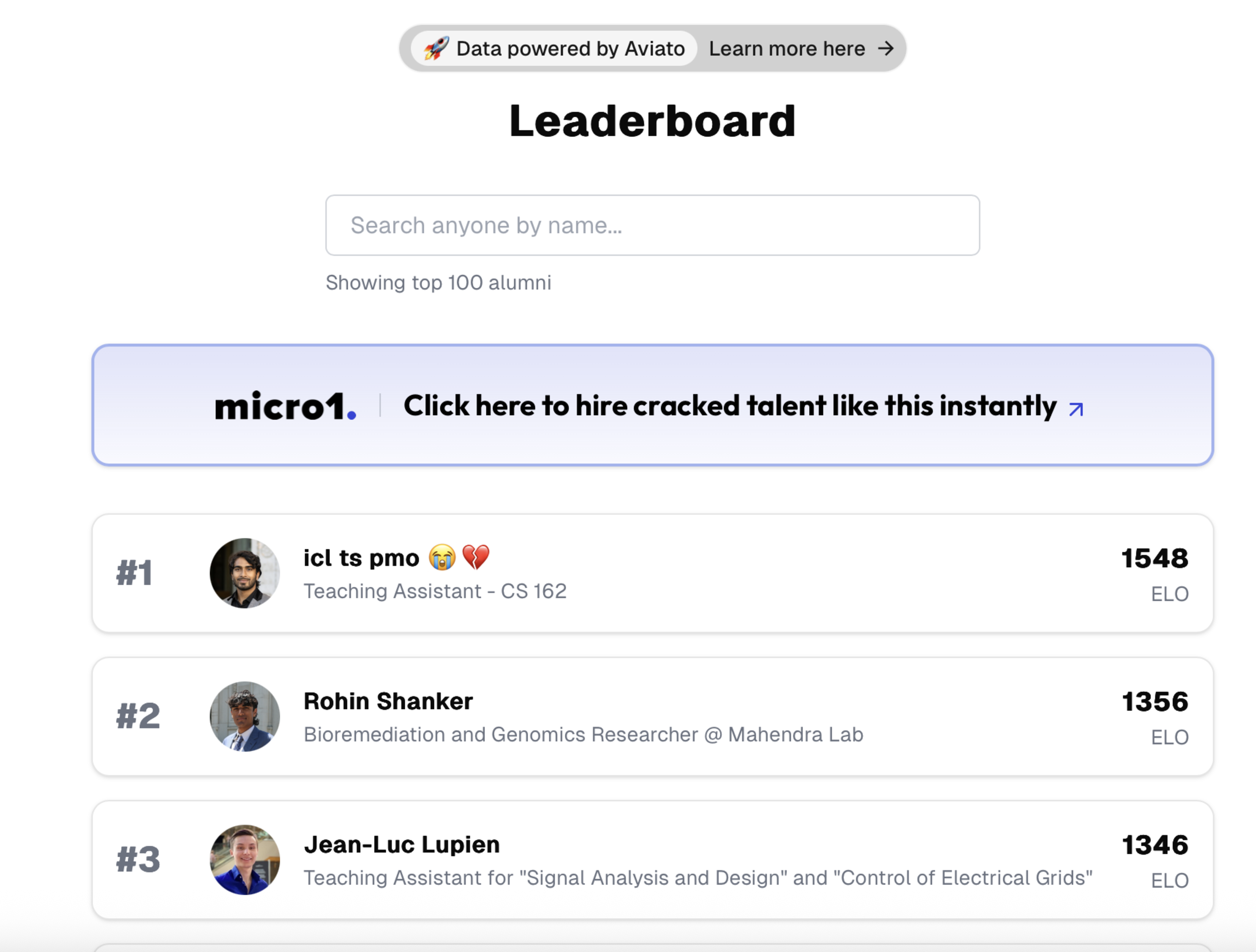Everybody knows the origin story of The Facebook, in which Harvard sophomore Mark Zuckerberg hacked into the university’s directory to pull photos of his classmates and built a website that asked users to rank their attractiveness.
Well, here we go again.
A new website, created by a University of Pennsylvania freshman, has been sweeping college campuses, including UC Berkeley and Stanford, asking people to rank students and alumni. But this time, the rankings aren’t based on sexy looks but on sexy résumés. It’s “Hot or Not: Capitalism Edition.”
Linkd (opens in new tab), a Y Combinator-backed startup, was created by Eric Mao as a search site meant to connect alumni working in specific industries. Mao and his team scraped university-affiliated public profiles from LinkedIn and added them to Linkd’s database — which offers semantic search, a function that aims to understand the meaning and intent behind a search, rather than simply matching keywords. It then compiles the top 100 university-affiliated résumés into a leaderboard, using a rating system called Elo (opens in new tab), developed for calculating skill level in games.
The site, which launched at UPenn in January, lists two people’s anonymized résumés and asks users to choose which is more “cracked.” (For the uninitiated, that’s Gen Z gaming slang for “talented.”) The more cracked the résumé, the higher up the Linkd leaderboard it goes. Click on any of the ranked profiles, and it’ll take you directly to the person’s LinkedIn page.
When Linkd launched at Berkeley in early March, the leaderboard caused a stir. Some students took to Reddit to call it “dystopian” and “ragebait.” Others were more forgiving. “I feel like, out of any school, Berkeley is probably the place where this would be a hit,” said Rohin Shanker, a Cal junior who first heard about Linkd when a friend informed him he was at the top of the leaderboard.
Shanker told The Standard he appreciated the ego boost, while another person on the leaderboard — who was unaware that the site existed until asked about it by this reporter — was unsettled, wondering how their info had wound up on the site without their permission.
Mao said the leaderboard and anonymous voting system were never meant to be the focal point of Linkd. It was just a way “to get this to go viral across campuses,” he said. He and his cofounder, Tom Zheng, used negative virality as a marketing scheme, bashing their own website on Reddit to get traction. “Are we seriously ranking people now?” they wrote in one of their planted (opens in new tab) posts.
The efforts worked almost too well. In response to the outrage on campus, a crop of students at UC Berkeley decided to hack the system, forcing their way to higher rankings.
Pranshu Rao, a UC Berkeley freshman studying computer science and electrical engineering, said he cracked the site’s code within a few days of launch. In 15 minutes, Rao and his roommate, Aayan Rizvi, boosted themselves to the top of the leaderboard by “botting” the site — using automated scripts to simulate repetitive actions, like voting for their own profiles.
At first, the roommates did it because they thought a Stanford student had created the platform. But even after they realized there was no connection to Cal’s rival, Rizvi and other competitive coders found joy in playing “a little game” to see who could stay at the top, he said.
Some of the leaderboard hackers say they were doing it for a good cause: They wanted to protect the psyches of fellow students by exposing the inexactitude of the leaderboard. To mess with the system even more, they changed their display names to Michael Jordan and LeBron James.
“It’s not actually a very reliable leaderboard,” Rao said.
Eventually, the coders were hacking the leaderboard with such frequency, the founders sent them a message, pleading, “Can you give us a break?”
Far from being discouraged by the algorithm hacking, the Linkd founders were impressed. “It’s a pretty good gauge of, like, technical ability across different schools,” Mao said. The founders have since been in talks with Rao and Rizvi to help strengthen their code.
Ironically, those competitive hackers ended up forming their own community of sorts.
Shamith Pasula, a senior at UC Berkeley who also cracked the Linkd code, said he eventually reached out to other coders at the top of the leaderboard to call for a truce.
“The whole point of ‘botting’ the website was to try and undermine the system so that you could never tell whether somebody was ‘botted’ or not,” said Pasula. “And I think that worked, because now, like, I have no idea, looking at the leaderboard, whether it’s serious or not.”
After The Standard spoke with Pasula, he said he was able to hack his way back to the top of the leaderboard, where he ranked first as of publication time.

Pasula pieced together that the website had been created through “vibe coding,” using large language models to write the bulk of the codebase. The technique can be useful for non-programmers but is prone to errors. Mao admitted that the voting feature was built over a weekend, with the help of AI.
A quarter-century since Zuckerberg’s anonymous voting gambit, there are endless metrics to fuel humanity’s obsession with ranking. However, like his undergrad geek predecessor, Linkd’s creator may be ready to pivot away from pitting people against one another on a ranking site. The startup’s next launch, at Canada’s University of Waterloo, is likely to be leaderboard-less, Mao said.
He confessed that the provocative element of Linkd had done its job. “It did drive us quite a bit of traffic,” he said, “but at the end of the day, our goal was to, you know, make a really great search.”

